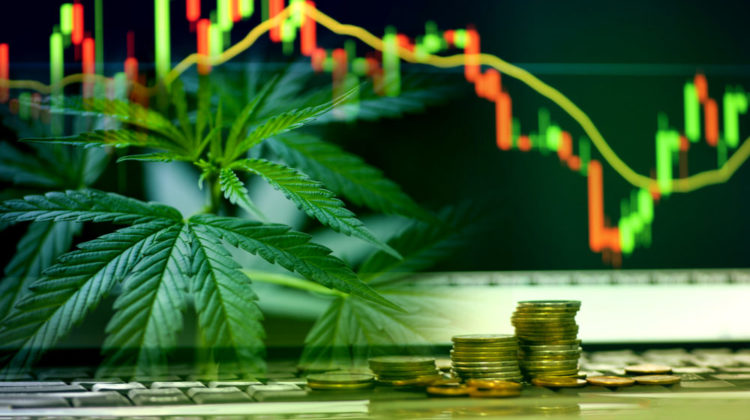
Dutchie, a cannabis tech company that provides customers with safe online access to their local dispensaries, has made industry history. This past week, Dutchie announced a valuation of $1.7 billion while completing its series C goal to raise $200 million.
Two newly acquired businesses now join the family, Leaflogix and Greenbits, with the introduction of new leadership. These are two more software companies that would evolve Dutchie’s current in-house technology.
Tech Crunch reports that this is a major jump from their previous two rounds of funding. Dutchie’s first round raised $15 million while their second in August 2020 raised them $35 million.
It’s interesting to speculate if these valuations are true or not, considering how unpredictable the cannabis market is. The amount of correction that takes place makes it at least a questionable claim.
Cannabis consumption has reached an all time high during the coronavirus pandemic. In fact 42% of current cannabis users increased their usage in 2020, according to New Frontier Data. States have begun legalizing it with more optimism about the revenue it could bring. Now, with online services, the distribution of online cannabis-related sales seems to resonate with investors.
Is Dutchie a Worthy Investment?
Since Dutchie oversees the online support of dispensaries by being paid to organize online sales, experts expect their business will only grow.
In 2020, the U.S. spent over $860 billion in e-commerce. Contactless shopping is becoming more common and profitable, especially with cannabis consumers, and it’s a direction that will create a lot more opportunity within the industry.
Experts project the cannabis industry to reach $24 billion by 2025. And during the 2020 November election, four states voted to legalize the plant.
In a newsletter announcing their valuation, Dutchie’s CEO Ross Lipson emphasized the company’s relationship with cannabis retailers, saying “Dutchie’s mission is to provide safe and easy access to cannabis while helping power the positive societal change that cannabis is bringing to the world.”
Given Dutchie’s call to action, commitment to giving consumers better access to cannabis online, and ability to form partnerships, it seems the brand’s presence will continue to grow. But there is no denying how heavy the correction is within the cannabis market. According to Investopedia, correction is when stocks unpredictably decrease by 10% or more. The value is then worth less than originally purchased for.
MjBizDaily clarifies the cannabis market’s instability, saying that, “determining the value of a cannabis company is extremely difficult, given the relative newness of the industry, the fact that each state has a different regulatory structure and the lack of widely used valuation benchmarks.”
In other words, the cannabis market is susceptible to frequent corrections because there are so many rules surrounding its legality. Cannabis company stocks usually become a risky investment.
Dutchie may be seeing success because they do not sell their own product. Instead, they push the retail of other cannabis-related businesses (CRB’s) into the hands of consumers.
Federal Illegality and the Stock Market
CRB’s are extremely volatile. Currently, recreational cannabis is legal in 15 states. 36 states permit its medicinal use. However, the United States Drug Enforcement Administration (DEA.) federally categorizes cannabis as a Schedule I drug.
The federal government views legal cannabis operations as criminal enterprises. As a result, there’s a consistent battle going on with the stock market. Shares go up and down, constantly raising problems for the plant’s overall market profitability. Investors will put their money in a stock, and in fear of heavy correction, they move it elsewhere quickly.
Most CRB’s operate via cash because federal law prohibits banks to work with them. This makes the market unpredictable. Transactions with banks could be considered illegal cannabis transactions on the federal level, so banks stay away in fear that government officials will charge them with money laundering.
The American Bar Association (ABA) explains the representation of cannabis finances in America, saying that:
“This state of legal limbo, which effectively prevents many [CRBs] from obtaining banking services, greatly increases the risks to which these businesses are exposed in that they must deal with vast amounts of cash, thereby increasing the risk of robbery and making it difficult to render payment to others.”
However, things may change in 2021. Lawmakers re-introduced the Secure and Fair Enforcement (SAFE) Banking Act to Congress to grant CRB’s banking liberties.
Rocky Investments
Ticker Tape, a brokerage news blog operated through TD Ameritrade, provides helpful tips to invest in the cannabis market. They recommend investing in multi-state operators or businesses that oversee the supply and infrastructure of CRBs.
The news blog writes, “investors looking for major winners in the space also run the risk of buying into major losers as the cannabis market becomes commoditized, increasing the importance of high quality and low price.”
Financial news publication Visual Capitalist investigates cannabis stocks and their corrections. In 2017, they reported that cannabis company stocks in the U.S. were valued at around $100 per share. In January 2018, an unpredictable stock market rise saw company stocks soar to approximately $360. That didn’t last because in 2019, those shares dropped back down to $111. This shows how hard it is to gauge the success of the cannabis market.
While Dutchie raised $200 in investment funding, they could still experience instability because they aren’t selling their own products. But the technology they provide could help make the valuation of CRB’s more accurate.
Cannabis economics will be more clear once legalization is passed on the federal level. Whether Dutchie’s valuation is accurate or not, they might still experience fluctuation themselves. These secondary markets can feel the correction of business stocks because their relationship with CRB’s can change as quickly as the market does.



Leave a Reply